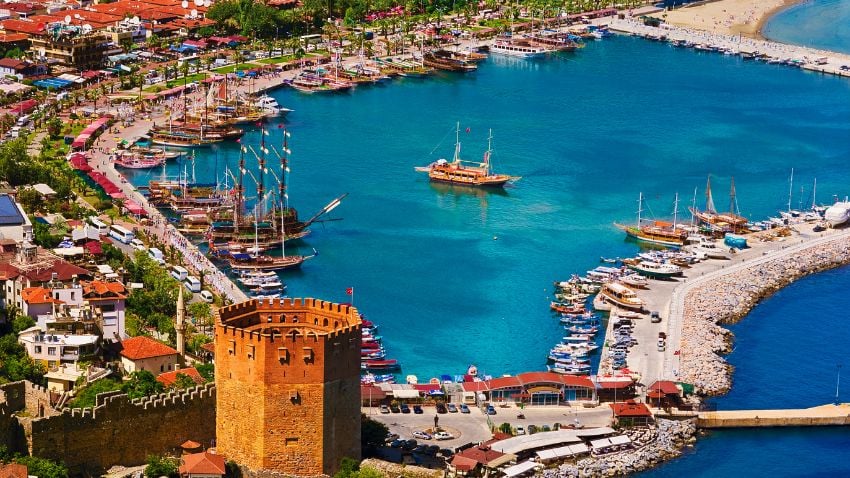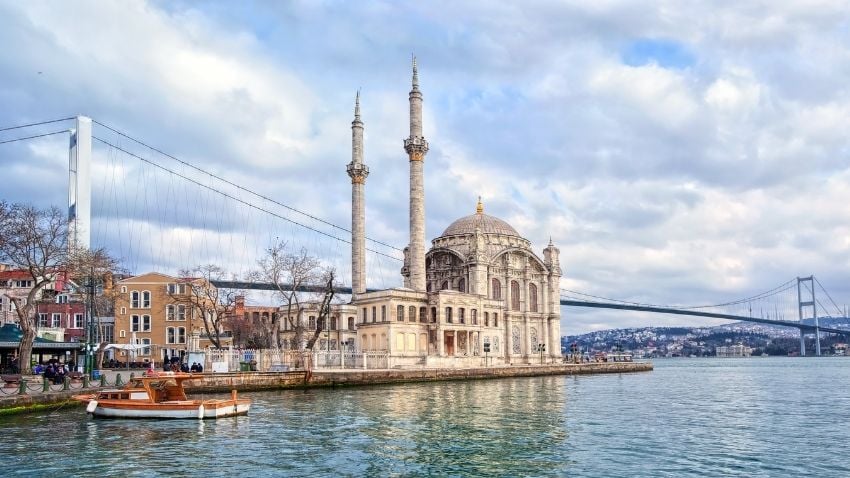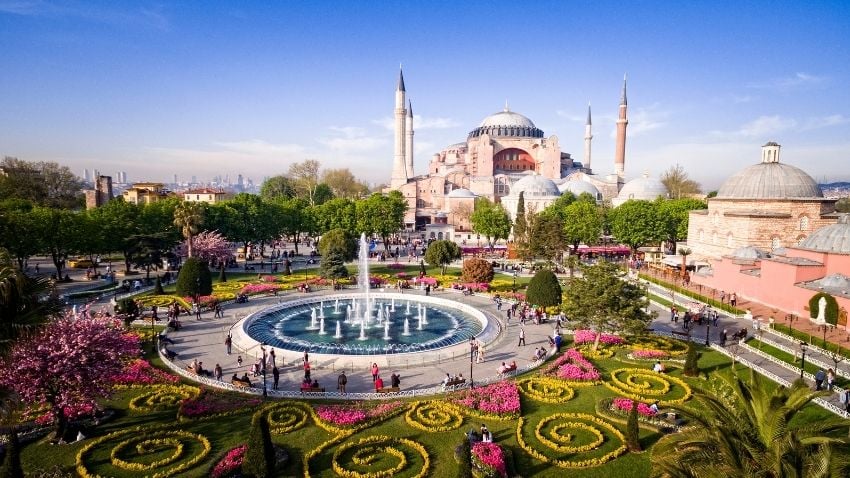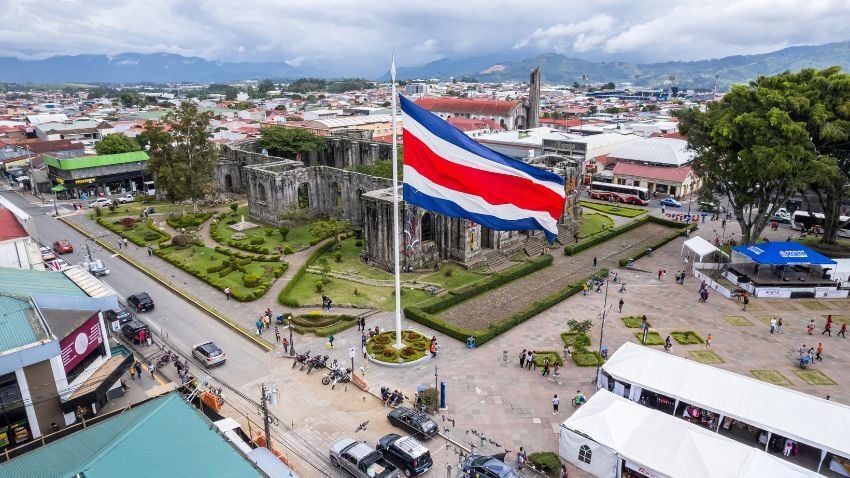How Safe Is Costa Rica?
Costa Rica has become one of the most popular expat and digital nomad destinations in Latin America, known for its natural beauty, relaxed lifestyle,...

10 min read
Turkey has officially applied for BRICS membership, which is expected to be announced at the BRICS summit in Russia in October. Some Turkish officials declare that Turkey’s BRICS application is part of its policy of increasing its global influence and establishing new alliances beyond its traditional Western allies. Another detail that draws attention is that Turkey’s application will occur during Russia’s new term presidency of BRICS.
Until recently, Turkey’s foreign policy has always been Western-centered. However, it appears that Turkey, an important member of the North Atlantic Treaty Organization (NATO), a strategic partner of the US and a European Union (EU) candidate, is experiencing a shift in its foreign policy.
It is now quite difficult to hide that we have come to the end of the unipolar world led by the US. For a long time, political differences and conflicts of interest between traditional Western powers and the developing world have become apparent in the Middle East, Ukraine and the Asia Pacific. We observe that political tensions frequently turn into hot wars or armed conflicts. The global economic and political order cannot continue as it was before. Turkey’s new position is just a sensational example of this new global economy-politics that has been awaited for a while.
In this new period, we are entering a period where many economic sectors in the West will never regain their former glory, and international disputes will lead to further armed conflicts. In the face of all these developments, expats cannot determine their direction based only on traditional institutions and policies. You must have a Plan-B to secure your wealth, freedom and your family's future. I would be happy to guide you on this journey. If you do not know where to start, subscribe to our free newsletter. Now, let’s look at what it means for Turkey to be a BRICS member.
BRICS is an international platform that comprises Brazil, Russia, India, China, and South Africa. It represents the five major emerging economies and gained five new members at the beginning of this year with the participation of Iran, the United Arab Emirates, Ethiopia, Egypt and Saudi Arabia. First emerging in the early 2000s, BRICS aimed to create an alternative economic and political power bloc to the Western Bloc (Northern America, Europe, the United Kingdom, and their strategic partner countries).
BRICS countries, especially Russia and China, are following a strategic approach to weaken the global hegemony of the Western Bloc, particularly the US. This grant vision can be divided into some strategic goals. The following is a brief explanation of the strategic goals of BRICS:
Multipolar World Order: BRICS leaders frequently declare the need for a multipolar world system to balance the US's hegemonic power over world affairs.
Alternative Reserve Currency: Maybe the most ambitious goal of the BRICS is to agree upon an alternative reserve currency to protect themselves from US-led economic sanctions. By establishing an alternative reserve currency, BRICS can develop alternative global financial institutions to replace institutions such as the IMF and the World Bank.
Geopolitical Power: Diplomatic cooperation to establish a common international agenda is another assertive goal of BRICS.
Energy and Resource Security: Securing access to energy and critical resources is another BRICS target to balance the US geopolitical power.
Stance Against US-led Sanctions and Military Dominance: One of the major issues regarding the BRICS agenda is countering US-led sanctions or military interventions. BRICS countries, China and Russia in particular, also see the Western democracy and human rights policies as interventionist and seem ready to defend their own sovereignty in this regard.
Technological and Industrial Development: BRICS seeks collaboration among member states to reduce their dependence on Western technology and industrial systems.
BRICS countries have rapidly growing economies that comprise a large part of the global economy. BRICS countries produce 28% of the world's total GDP and host approximately 40% of the world's population. BRICS members also have substantial military power, including nuclear weapons, and Turkey’s membership might further complicate the military power balance between the blocs since Turkey has the second-biggest army in NATO.
With their large populations, rising economies, and natural resource wealth, member countries play an important role in global trade and politics. The importance of BRICS stems from their strategies to create an economic and political balance against Western allies, especially the US.
However, the most important global effect of BRICS would be to further the process of de-dollarization. This change would have devastating effects on the US economy and those investing in US dollar-denominated assets. It would also end the dollar's weaponization by taking the US's economic sanctions trump card. As a result, the global balance of power would change radically. The most important strategy for BRICS de-dollarization is to create a new currency based on commodities. Let's briefly examine how an alternative currency would work and its consequences.
The value of a commodity-based currency is based on gold, oil, natural gas, foodstuffs or other valuable commodities. BRICS' commodity-based currency will be based on the natural resource wealth of member countries. For example, Brazil is a major producer of agriculture and minerals, Russia of oil and natural gas, South Africa of gold and other precious metals, and China of industrial metals. These countries can index the value of their currencies to these resources by using a reserve system based on these commodities in their trade. So, this currency can be an alternative to the dollar in global markets.
One of the best examples of commodity-based currencies is oil-based trade. Russia and China tend to move away from the dollar and use local currencies in the oil and natural gas trade. The impacts of Saudi Arabia's support of this plan would also be huge. If this trade is conducted in a commodity-based currency developed by BRICS, this new currency could be directly linked to oil prices.
De-dollarization can have dreadful consequences for the US economy. First, it will reduce demand for the dollar and increase inflationary pressures in the US. Diminishing demand for the US dollar will increase import and borrowing costs.
When investment in US bonds and treasuries falls sharply, the US will have no alternative income to borrow. While it is certain that the US government will increase taxes in this scenario, it is also clear that tax revenues will decrease in a shrinking economy. The impact of the US national debt of $33 trillion will likely last for generations if the US cannot sell the inflation it creates by printing money to the world.
In addition, a decrease in demand for the US dollar could lead to uncertainty and volatility in the US financial markets, and investors may move away from US assets. Furthermore, the de-dollarization process will have a negative impact on the US's foreign trade balance and export competitiveness.
The effectiveness of US global sanctions is based on the dominance of the dollar in international trade. For example, after Russia invaded Ukraine, the US and its allies froze Russia's reserves worth $300 billion and seized many Russian assets. These sanctions greatly restricted Russia's access to the global financial system and increased its costs and ability to do transactions.
A similar scenario might be played for China in the Asia Pacific. So, China is accelerating de-dollarization out of concern that the US may impose sanctions on it in the future. China uses its own currency, the Yuan, more widely in international trade, investing heavily in gold reserves and staying away from US bonds to protect itself from the potential effects of US sanctions.
If the BRICS countries successfully lead the de-dollarization process, the strength of US sanctions imposed on the dollar will decrease dramatically. So, one of the pillars of the US global geopolitical strategy will be eliminated.

Turkey's geopolitical significance as a bridge between Europe, the Middle East, and Asia positions it as a vital partner for the West in managing regional security, energy supply, and migration control
Due to its geopolitical location, Turkey plays an important role in regional stability and security as a bridge connecting Europe to the Middle East, Asia, and the Caucasus. While it secures the European Union’s eastern borders, Turkey has also become an indispensable partner to stop irregular migration to Europe.
Hosting millions of refugees, Turkey keeps irregular migration to Europe under control. In addition, Turkey plays an important role in ensuring the EU’s energy supply security as an important transit country for the transportation of energy resources to Europe. Many energy lines extending from the Middle East to Europe pass through Turkey, making Turkey important in ensuring the West’s energy security.
Turkey has been a key balancing actor in the US strategies against Russia. Its second-largest army in NATO, its strategic location in the Black Sea and the Middle East, and its critical role in terms of energy security make Turkey indispensable to the US. The NATO base on the Turkish Mediterranean coast is also crucial for the US in both its intervention against Russia and the Middle East.
Turkey borders crisis regions such as Syria, Iraq and Iran, and developments in these countries can directly affect the West’s security policies. Turkey’s military presence and security policies in the region are of critical importance to the West, especially in the fight against terrorism and reducing the influence of radical groups such as ISIS.
The Western Bloc, especially the US, sees Turkey as an important partner in maintaining its influence in the Middle East and counterbalancing the growing influence of actors such as Russia and Iran.

Turkey is pivoting towards BRICS and Eastern alliances, reshaping its foreign policy and economic strategy amidst strained NATO relations and limited Western support
Turkey's foreign policy has evolved from a traditional Western-centered strategy to a more balanced, multi-faceted, and independent stance, described as an "axis shift." Accordingly, Turkey has been making radical changes in its alliance relations with NATO and the West and is transitioning to a new foreign policy approach. Turkey tries to develop its relations with the East by reducing its dependence on the West.
Despite being one of the oldest members of NATO, Turkey has been experiencing various problems with this alliance in recent years. In particular, The US military support to Kurdish groups in North Syria and Turkey's purchase of the S-400 air defence system has increased the tension between Turkey and NATO. While NATO sees Turkey's acquisition of the Russian S-400 missiles as a serious security threat, Turkey argues that it is acting in line with its own national security interests. Because of the S-400 crisis, the US left Turkey out of the F-35 fighter jet project and refused to sell any more F-16 fighters to Turkey. F-16 fighters are the backbone of the Turkish Air Force, and without F-35 fighters, Turkey would lose its leverage against Greece in the Mediterranean. Such conflicts within NATO have caused Turkey to question its position in the alliance and turn to alternative security partnerships.
After the 2016 coup attempt in Turkey, Turkey-Russia relations have improved significantly. In addition, Turkey is heavily dependent on Russia for energy. In addition to purchasing oil and natural gas, a Russian company has constructed and owned the only nuclear power plant in Turkey. This rapprochement with Russia has caused concern in the West, while Turkey's role in NATO has been brought into question.
In recent years, Turkey has increased its cross-border military operations. Its military presence in Syria, Libya, Northern Iraq, Nagorno-Karabakh, Qatar, and Africa reflects Turkey's efforts to become a regional power. In particular, the operations in Syria and Libya aim to protect Turkey's strategic interests in the Middle East and North Africa. Although these operations occasionally cause tensions with the US and the EU, Turkey continues pursuing a foreign policy prioritizing its security and geopolitical interests.
The Ukraine-Russia war clearly revealed Turkey’s balancing policy. While Turkey supported Kyiv by selling unmanned aerial vehicles to Ukraine, it maintained its commercial and diplomatic relations with Russia. During this process, Turkey implemented the Montreux Convention and prevented military ships from passing through the Bosphorus Strait into the Black Sea. Afterwards, it hosted peace talks and assumed the role of a neutral mediator.
Turkey has also recently experienced significant changes in its foreign trade policies. Although Turkey makes nearly half of its exports to EU countries, it has started to focus more on Asian, African, and Latin American markets. The increase in trade, especially with BRICS countries, has strengthened Turkey's economic relations with these countries. In addition, Turkey, included in China's "Belt and Road" project, is trying to reshape its role in global trade.
Turkey has been struggling with economic problems such as high inflation, which has been felt heavily since 2020. It has not received the full support expected from the West during this crisis. Diplomatic problems with Europe and the US have delayed or inadequate economic aid, which has directed Turkey to alternative financing sources. Economic agreements, especially with the Gulf countries, Russia, and China, indicate Turkey's search for support from non-Western sources.
The economic crisis and the lack of support expected from the West have caused Turkey to turn to alternative economic and political platforms such as BRICS. Strengthening trade and economic relations with BRICS can be considered part of Turkey’s desire to pursue a more independent policy in the global arena. Furthermore, increasing economic cooperation with BRICS countries shows that Turkey is turning more towards the East regarding the global balance of power.

BRICS faces internal divisions and risks in pursuit of an alternative to the western bloc
The US's control over the dollar and the global financial system has enabled it to use economic sanctions as a tool to impose its foreign policy on other countries. Many countries outside the Western Bloc are concerned about this situation. Furthermore, the wars launched by the US in the Middle East and Afghanistan have largely failed and have caused serious damage to global stability.
Since the early 2000s, developments such as Russia reasserting its former regional dominance, China rejoining global politics as an economic power, or India strengthening itself as an autonomous player in Asia Pacific have strengthened the demand for a reshuffling of the cards in the global game for many countries.
In this process, many developing countries have reinforced the idea that they cannot sustain their national security and economic development by simply integrating into the Western bloc and pursuing a dependent foreign policy. These countries seem determined to redefine themselves as more independent actors and, at least for now, to pursue a balancing policy.
Can BRICS be an answer to different developing countries that are dissatisfied with the Western bloc and trying to reposition themselves? The answer to this question is not clear at the moment. There are serious conflicts of interest among BRICS members in their economic and foreign policies, and they are still far from establishing a political and economic system suitable for implementing the policies they claim. For example, even if BRICS could agree on an alternative reserve currency other than the dollar, it would be an initiative that could not be realized without risking the emergence of some large-scale conflicts and perhaps wars.

As BRICS challenges the Western bloc and de-dollarization gains momentum, investors are increasingly seeking alternatives like international real estate and precious metals to protect their wealth from heightened financial risks and currency instability
The Western bloc is being challenged by the BRICS alliance, raising geopolitical risks for investors. Financial or bond markets are perceived as carrying higher risks than ever. The accelerating trend of de-dollarization is paving the way for a potential financial shift that could affect savings and investments linked to the US dollar. As a result, many savvy investors are exploring alternative investment options to protect their wealth in anticipation of future de-dollarization.
One popular strategy is to invest in international real estate, forest land, or farmland, which can provide returns on your savings while protecting them from a possible financial crisis created by de-dollarization. You may also prefer to invest in gold, silver, and precious metals to avoid the devaluation of fiat currencies. Precious metals, particularly gold, are historically the ultimate hedge for inflation and fluctuations.

As BRICS challenges Western hegemony, many investors explore alternative investment opportunities to safeguard their wealth and secure a stable future in an increasingly multipolar world
The rise of BRICS represents a counterbalance to the global hegemony of the US and the Western bloc. Turkey's turning to this alliance and reconsidering its Western-centric policies indicates that the change in the world order is accelerating. In this process, it is obvious that the West's traditional economic power and political influence will not be as strong as before and that a multipolar order is emerging.
As an expat, relying solely on traditional Western institutions to secure your wealth, freedom, and family’s future is no longer enough. Considering alternative investments can be critical to protecting you and your loved ones in the face of increasing uncertainty, international tensions, and global economic imbalances. I will happily guide you if you want to craft a Plan-B by closely following global developments. You can subscribe to our free newsletter now to receive the most up-to-date information on offshore investment opportunities. In this way, you can also evaluate the opportunities that new formations like BRICS have created.
If you want the best intel from the expat world, including profitable offshore opportunities, little-known tax-saving strategies, and hard-won insights on immigration, passports, and Plan-B residencies, all delivered to your inbox every single week, then join our daily correspondence, EMS Pulse®. Currently enjoyed by over 84,000 expats and expat-hopefuls worldwide. Fill in the form below to join our newsletter free:

Written by Mikkel Thorup
Mikkel Thorup is the world’s most sought-after expat consultant. He focuses on helping high-net-worth private clients to legally mitigate tax liabilities, obtain a second residency and citizenship, and assemble a portfolio of foreign investments including international real estate, timber plantations, agricultural land and other hard-money tangible assets. Mikkel is the Founder and CEO at Expat Money®, a private consulting firm started in 2017. He hosts the popular weekly podcast, the Expat Money Show, and wrote the definitive #1-Best Selling book Expat Secrets - How To Pay Zero Taxes, Live Overseas And Make Giant Piles Of Money, and his second book: Expats Guide On Moving To Mexico.

Costa Rica has become one of the most popular expat and digital nomad destinations in Latin America, known for its natural beauty, relaxed lifestyle,...

Mexico remains one of Latin America’s most compelling destinations, especially for North Americans. More than a million expats call it home, and tens...

South Korea is far more than K-pop and K-dramas. It is a country known for outstanding food, from bustling street markets to high-end dining, as well...